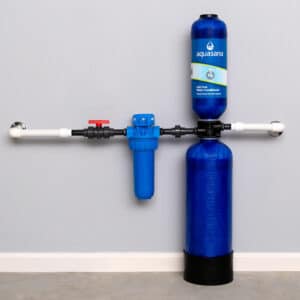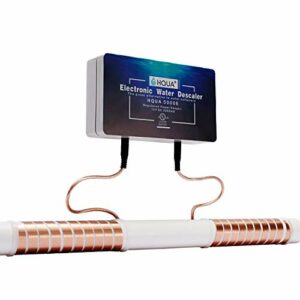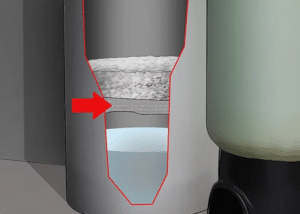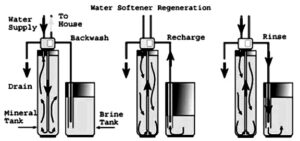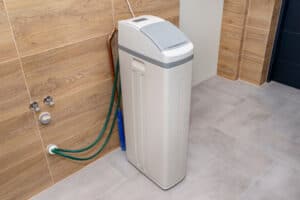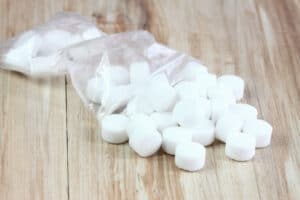Water softeners can remove debris and hard minerals, resulting in safe, clean, and usable water. The process can be daunting to learn, but we’ll provide you everything you need to know to answer the question, “How does a water softener work?”
Read on to discover everything you need to know about water softeners.
What is a Water Softener?
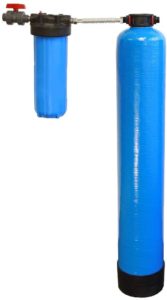
A water softener is a filtration system that removes most “hard water” minerals.
Rainwater and underground water are soft until they go through aquifers and areas with minerals and limestone. As a result, hard water, with minerals such as calcium and magnesium, enters the water supply.
Hard water can cause build-up in boilers and water heaters, producing corrosion, resulting in less efficiency and more expense. Hard water creates long-term negative benefits for most households, including people, as hard water can be harsh on the skin.
Also, hard water can leave scale deposits, resulting in a mineral build-up in your favorite coffee maker and water supply pipes. Hard water can reduce water flow, shortening the life span of a water heater and other appliances, producing damage to plumbing and fixtures in the long-run.
Standard water softeners then use an ion-exchange process to replace these minerals for safer, more usable water.
What Does a Water Softener Remove?
Now that you know what is a water softener, the next question is, what does a water softener do? They simply remove and replace minerals.
Water softeners remove minerals such as calcium and magnesium. Both calcium and magnesium produce hard water spots on kitchen appliances, the shower and cause build-up through the pipes. Depending on the water softener, some may remove harmful bacteria and chemicals.
Some water softener systems remove and replace these minerals to make the water safer to drink, called “soft water.”
Also, water softeners can remove existing scales to reverse damage caused by hard water.
How Do Water Softeners Work?
If you’re wondering how does a water softener work—know that the process is straightforward, with a few components working together.
Water softeners remove hard water minerals using a regeneration process. Ion-exchange systems have three components that work together to filter and remove magnesium and calcium.
The water supply that contains hard water goes through the filtration system involving two different tanks.
The mineral tank “softens” the water as the hard water is stripped of its minerals, swapped with sodium ions. This tank has plastic beads with a negative charge that attract the hard water minerals.
Next, a regeneration cycle occurs. The control valve, which you will learn about later in this article, determines when to regenerate. Usually, this process occurs once a week, adding new salts into the tank to repeat.
The mineral-rich water flushes into your local septic tank as the newly filtered water enters your home. The control valve, which you will learn about later in this article, determines when to regenerate. Usually, this process occurs once a week, adding new salts into the tank to repeat.
What are the Pros & Cons of Water Softeners?
There are several benefits and drawbacks of using water softeners. Let’s take a look at the pros and cons of water softeners.
Pros of Water Softeners
The pros of using water softeners include:
- Reduce and further prevent scale build-up: If you’re familiar with white, crusty limescale build-up on your pipes, that is the result of hard water minerals. Other scale build-ups can end up inside washing machines and household appliances, reducing its efficiency.
- May increase longevity of household appliances: Every appliance that uses water is at risk for corrosion, which decreases the lifespan of water heaters and anything else that extensively uses water.
- Better soap lathers: Soft water encourages better lathering of detergents and soaps. As a result, you will need less soap, using smaller amounts with better results.
- It is better for skin and hair: Hard water can make the hair appear dull and lifeless as it strips away moisture. Hard water does not entirely remove shampoo and soap when you bathe, leaving scum behind. It can also be drying on the skin.
- Fewer streaks on glassware and kitchen appliances: Hard water spots are common on kitchen appliances, dishes, and glassware, leaving behind residue.
- Softer clothes: Hard water can be rough on clothes in the washing machine, resulting in stiff fabric. Soft water reduces friction, resulting in smoother fabric.
Cons of Water Softeners
The cons of using water softeners include:
- Increases sodium intake: While water softeners do not include salt, the plastic beads are covered in sodium ions, swapping with magnesium and calcium. For some people, an increase in sodium is not advised, despite the amount being small.
- Regular maintenance: The water softener must regenerate once a week, requiring replenishment of salts and regular upkeep.
- An investment: For many, water softeners will be an investment with the upfront cost and regular maintenance. Buying bags of salts will also increase costs.
What Are The Components of a Water Softener System?
Since ion-exchange is the most common, we will go through the different parts and processes each component produces. There are three main components: the mineral tank, brine tank, and control valve.
Let’s dive into each component and expand on the process of each.
Mineral Tank
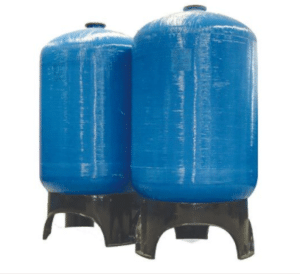
The mineral tank is a tall, narrow tank where the water softening process occurs. The water filtration process takes place, removing calcium and magnesium, resulting in soft water. It is filled with plastic polystyrene resin beads that ignite the ionic process.
As water flows through the mineral tank, the negatively charged beads attract positively charged magnesium and calcium, holding and exchanging them. After, the water outflowing is now soft as the resin beads trap the hard water minerals.
Over time, the beads become full of minerals, needing to be changed, called the regeneration process. The regeneration process occurs in the control valve, explained later on.
Brine Tank
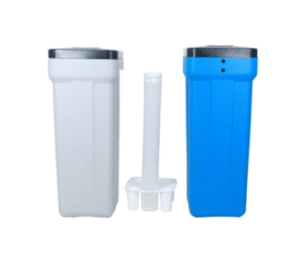
As the name suggests, a brine tank is a plastic tank containing brine—high concentrations of salt. Other water softener systems may have potassium instead of salt for those who have issues with high sodium.
The primary goal of the brine tank is to use the saltwater to backwash the mineral tank, remove hard water minerals, and restore the negative charge to beads to continue attracting minerals.
Since the brine tank is filled with salt, a small amount may seep into the drinking water during regeneration. Those on low-sodium diets may opt for potassium-chloride, which is deemed safer and more eco-friendly.
Sodium also affects the bacteria in septic tanks which breaks down waste, prompting some states to ban sodium brine.
Control Valve
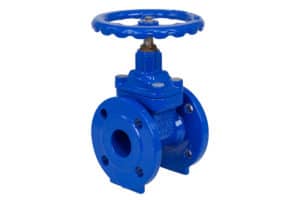
The control valve determines when it’s time to clean the plastic beads as they become saturated with magnesium and calcium. Some systems use a high-tech LCD screen, a timer, or a computer-controlled meter.
Control valves are the main component of the regeneration process. The three cycles of regeneration include:
- Backwash: The backwash cycle is the beginning of the regeneration process, as the valve reverses water flow in the tank, flushing the tank of debris. After, debris is removed through the drain connected to the sewer or septic system.
- Recharge: Recharge is also known as regeneration, as the high concentration of salt is pumped from the brine tank to the mineral tank. The sodium solution forces magnesium and calcium off the plastic beads, with the mineral-rich brine water flushed out the tank down the drain.
- Rinse: The mineral tank fills with water and rinses as the regeneration process pauses and the water softening process repeats.
As the regenerated mineral tank, the beads are coated with sodium from the brine tank. As more hard water enters the mineral tank, positively charged magnesium and calcium are attracted to the beads, replacing sodium beads.
A small amount of sodium enters the water supply in this process, which may not be an issue for healthy individuals.
As the beads become saturated again with hard water minerals, the control valve begins a new regeneration cycle, flushing out magnesium and calcium in the drain once again.
As long as the brine tank is filled with salt or potassium pellets, this process will continue. It usually occurs in the middle of the night.
What Are The Different Types of Water Softeners?
There are roughly seven types of water softeners, varying in different processes and budgets.
Continue reading to find out the different water softener types and which may be right for you.
Ion-Exchange Water Softener
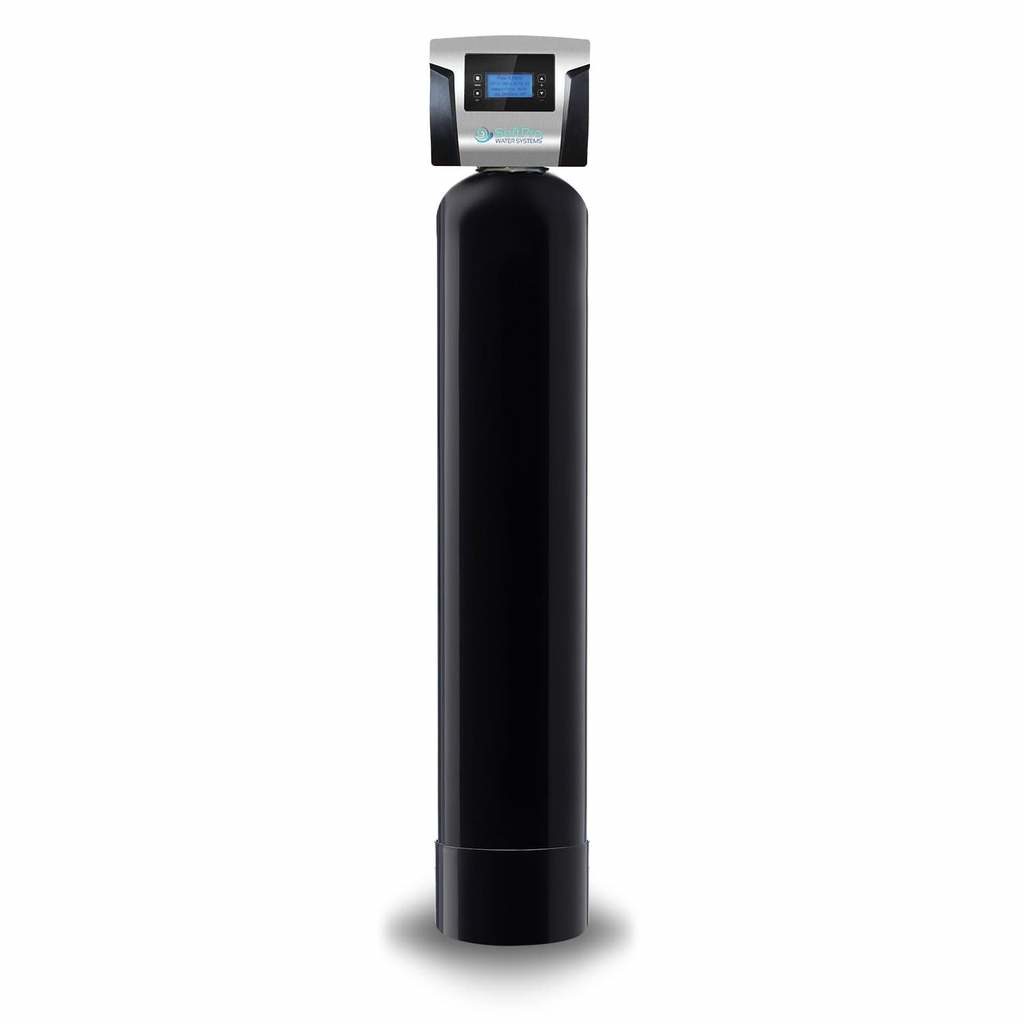
An ion-exchange water softener, also known as salt-based, is the most commonly used water softener in households with a single tank.
It goes through an ion-exchange process, where a resin attracts magnesium and calcium from your water, changing them to sodium ions. Over time, the resin may run out of positively charged ions, prompting regeneration using salt.
This system will remove hard water causing minerals. However, they will not remove bacteria or chemicals present in the water.
This device requires regular maintenance and regeneration about once a week. The resin will last for years and replaceable at a low cost.
Salt-Free Water Softener
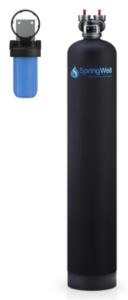
Salt-free water softeners require less maintenance than salt-based systems since it does not require regeneration or salt.
Although, this system does not remove hard water minerals. Instead, salt-free water softeners neutralize them, preventing further build-up leads up to hard water.
Many salt-free water softeners feature a multi-stage filtration process that not only neutralizes minerals but removes chemicals, bacteria, and other unwanted impurities.
Salt-free water softeners tend to be more expensive upfront but become more cost-effective in the long-run, as you will not have to add salts every week. Also, they are most compact, as there is no additional tank for draining.
Related: Best Salt Free Water Softener Systems
Dual-Tank Water Softener
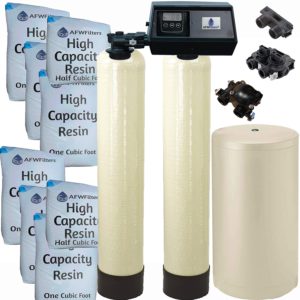
Dual-tank water softeners tend to be salt-based. Dual-tank is for larger homes, high-water usage, or irregular regeneration schedules. Since most salt-based systems are a single tank, a dual-tank gives one tank the opportunity to regenerate and one tank for available use to access soft water anytime.
Unfortunately, dual-tanks take up more space and will cost more money than single tanks.
Dual-tanks are also available with salt-free systems.
Reverse Osmosis Water Softener
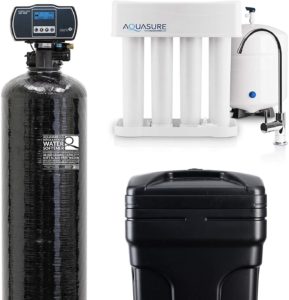
Generally, reverse osmosis water softeners are seen as water softener alternatives, but they remove minerals and other substances that cause hard water, such as magnesium and calcium.
Since this system strips the water of many substances, there are extra steps to re-introduce health minerals for drinking. Reverse osmosis installations occur under the sink, with units providing their own faucet for soft water on tap or purified water.
Reverse osmosis calls for high-pressure, forcing the water through a membrane that filters the water down to microscopic levels, fed through other filters to remove impurities.
While this system can be expensive, it produces healthy mineral drinking water and unlimited reverse osmosis water on tap.
Portable Water Softener
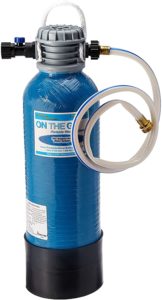
If you travel in an RV or travel trailer, a portable water softener can have soft water on the go.
While they do not supply the same water flow level compared to a full-size softener, they are more affordable and require no electricity. There is also less maintenance involved, as it can take several weeks to regenerate. To regenerate requires a small amount of table salt with no tools necessary.
Shower Head Water Softener
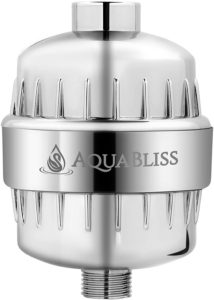
Since water softener systems can be expensive, showerhead water softeners are available for those who want soft water benefits without buying the whole system.
Soft water can make your skin and hair feel more hydrated and healthy. Remove your old showerhead and attach a shower head water softener. It requires replacement every two months, as the showerheads feature cartridge filters to remove hard water minerals and more.
There are other filters available filled with vitamins for more benefits. However, they may contain unwanted additives and unpleasant scents.
Showerheads are notorious for hard water spots spreading to the walls and doors. With showerhead water softeners, you will have less soap scum and clean-up.
Related: Shower Water Softeners: What Are They?
Magnetic Water Softener
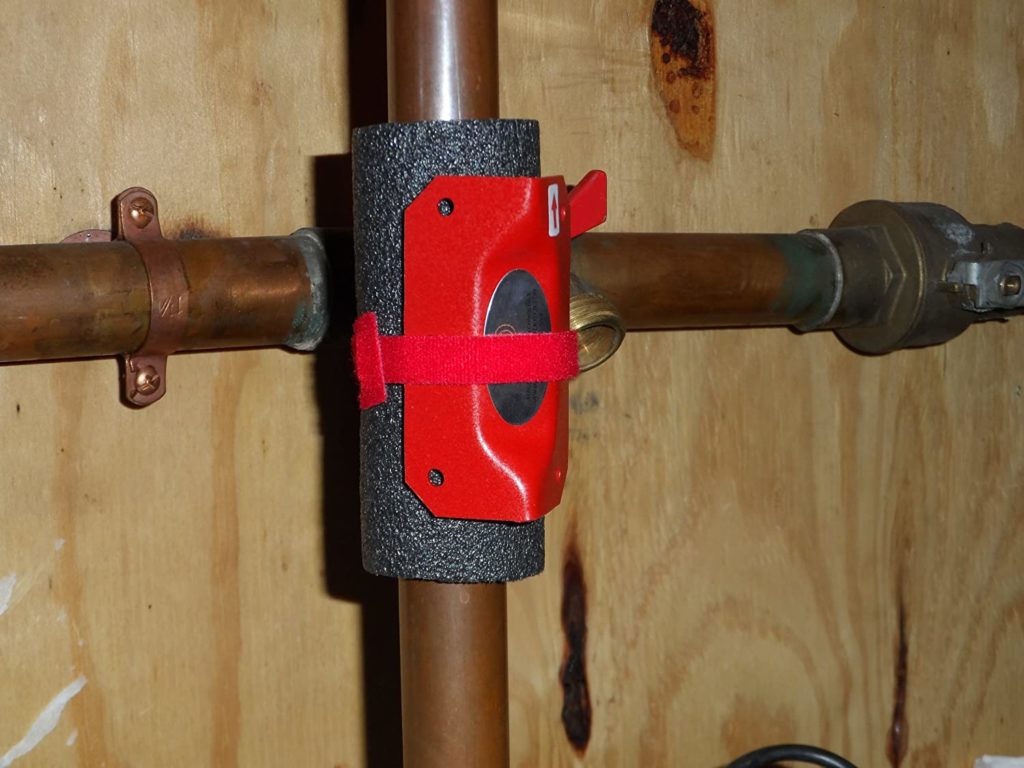
Magnetic water softeners are new to the market and may be considered an alternative since they do not remove hard water minerals. However, similar to salt-free systems, it neutralizes hard minerals, keeping them soluble and not bonding together.
Magnetic water softeners are affordable and reap the benefits of soft water despite a different system. They are easy to install, and no pipe cutting or turning off the water will occur. This system is wrapped around existing pipes, creating a magnetic field as the water passes.
Unfortunately, it requires electricity, and you may need to wire them into the home’s electric system. Also, an older study may suggest they do not work as intended. Today, there are mixed reviews, with many satisfied customers and others opting for a standard water softener.
When Do I Need A Water Softener?
Buying a water softening is a personal decision for your household and environment.
However, testing your water hardness may be the first step to determining if you need a water softener. The water hardness scale uses grains per gallon (GPG) and milligrams per liter (mg/L):
- Soft: Less than 1.0 GPG; Less than 17 mg/L
- Slightly hard: 1.0 to 3.5 GPG; 17 to 60 mg/L
- Moderately hard: 3.5 to 7.0 GPG; 60 to 120 mg/L
- Hard: 7.0 to 10.5 GPG; 120 to 180 mg/L
- Very hard: More than 10.5; More than 180 mg/L
If your water is more than 7.0 GPG or 120 mg/L, it may be time to consider getting a water softener.
Hard water does damage to household appliances, pipes, showers, and more. Build-up can also decrease the lifespan of your household devices.
If you are experiencing corrosion in your pipes, broken down water heaters, spots on your kitchen utensils, bathroom scum in the shower—a water softener may be necessary.
How Much Will Water Softener Cost?
A water softener cost depends on several factors, such as your budget, the type of water softener, name brand, and capacity. Installation fees and maintenance also add to the costs of the water softeners.
In particular, the water softener capacity depends on the grains and grains per gallon (GPG):
- 0 – 3,500 GPG: 24,000 Grains capacity
- 3,501 – 4,500: 32,000 Grains capacity
- 4,501 – 6,850: 48,000 Grains capacity
- 6,851 – 9,150; 64,000 Grains capacity
- 9,151 – 11,500: 80,000 Grains capacity
Typical ion-exchange water softener capacity for residential homes is around 32,000 to 48,000 Grains. The lower the capacity, the less expensive it is, including long-term costs and installation. High-end water softeners tend to be 64,000 to 80,000 Grains, requiring more maintenance costs.
Ion-exchange water softenerscost between $550 and $2,250 on average. The installation costs are amongst the lowest, as they are easy to install and the most common water softener for residential use. Salt or bags to replenish the tank for regeneration may cost an extra $10 to $20 a month.
Prices of Other Water Softeners
Salt-free water softeners cost more than standard ion-exchange systems, at around $850 to $4,250. These are deemed safer for the environment, as they use potassium-chloride instead of sodium ions. It requires fewer maintenance fees and general upkeep but a higher upfront cost.
Dual tank water softeners are around $1,000 to $2,750, with most of the cost coming from installation fees. Dual tanks take up more space and are ideal for larger homes with more water usage.
Reverse osmosis water softeners are expensive, as the installation is complex and the device is uncommon. Prices range between $4,250 to $11,750.
Portable water softeners are amongst the most affordable, ranging from $175 to $450. These require less maintenance, lightweight, easy to regenerate, and easy to install.
Showerhead water softeners are the most affordable, between $30 to $75. However, the filter inside the showerhead lasts roughly six months or 10,000 gallons. The filters cost $20 to $45. Long-term, it’s less expensive than a bigger system, but showerheads only work in one area instead of the entire home.
Magnetic water softeners are newer to the market but are affordable, averaging $250 to $650. Unlike other systems, you can install it yourself, requiring no labor costs. The device goes around any pipe you want, with no pipe cutting required.
Related:
When Do I Need to Replace My Water Softener?
There are common signs to look for in case you need to replace your water softener. Keep in mind the cost will be the same as a new installation, with repairs pricing similar to labor costs.
Some signs you need to replace your water softener include:
- Less lather: Water softeners produce more lather with soaps and shampoo. If you see a reduction in a foam or none at all, it may be time to check on the water softener.
- Laundry problems: Hard water tends to build-up in washing machines and produces stiff clothing. If your clothes were soft with an effective water softener, yet build-up began, and clothing texture changed, it may be a sign the water softener must be fixed or replaced.
- A crusty build-up in pipes: The most common issue with hard water is corrosion and build-up in pipes. These substances tend to be white or yellow, causing blockages. Water softeners reduce scales and prevent them, but the system is not working if a chalky substance emerges.
- Change in taste: There is a noticeable difference in taste, as soft water is smoother. If you are drinking straight from the tap but notice a change, consider evaluating the water softener.
- Broken appliances: Water heaters see lots of water flow, and if it begins to break down and leak, there may be issues with corrosion in the pipes caused by hard water.
- Changes in hair and skin: Hard water and soft water affect the skin and hair differently. Hard water removes moisture, while soft water allows moisture absorption. If your scalp or hair begins to look full and feel dry, the water softener may not be working correctly.
- Spots on kitchenware: Hard water spots on kitchenware signals hard water returned, meaning the water softener may need repair or replacement.
- Soap scum: The tub, showerhead, bathroom walls are susceptible to soap scum produced by hard water. Soft water reduces soap scum, but if more soap scum is emerging, the water softener may be ineffective and needs repair or replacement.
Related:
Water Softener FAQ
Here are some questions people may have about water softeners.
For most people, yes, it is safe to drink water from a water softener. The high amounts of sodium may concern some people, although most can drink the water with no side effects. If high sodium is an issue, it can balance with a potassium-based softening system.
Most healthy adults may see no side effects or health risks from a water softener. The amount of sodium is small enough that it may not cause any adverse health risks. When in doubt, you can consult your doctor if you have a history of reducing sodium intake for health reasons.
No, water softeners do not add salt to the water. Minerals such as calcium and magnesium are removed from the water using an ion exchange process. As are a result, the hard minerals in your water are replaced by charged sodium ions.
Yes, after some time, the water softener removes the existing scale. The minerals that clog your pipes and other deposits will eventually be eliminated. Water softeners also prevent future scales from building up.
No, soft water is not bad for your skin, as soap lathers and washes away easier than hard water. The minerals in hard water may cause your skin to dry out. Soft water can retain some of that moisture loss you may have experienced with hard water.
Currently, no evidence supports soft water causing baldness. Hard water dries out the hair, leaving it more full and stripping it of moisture. Soft water penetrates the hair better, leaving it softer and shinier.
Over a prolonged period, yes, soft water kills plants. Occasionally water your plants with soft water can be harmless, but over time, the soft water tricks the plant into thinking it needs more water, essentially dying of thirst.
Conclusion
This article has answered the most common question around water softeners—How does a water softener work?
The process is regeneration, involving the three main components: mineral tank, brine tank, and control valve. In the mineral tank, plastic beads attract hard water minerals such as calcium and magnesium, producing charged sodium ions. As a result, the water is “soft,” making it safer for your home.
The most common water softener is the ion-exchange, also called salt-based system. Other water softeners exist that range from different prices and capacities.
Overall, there is a water softener for everyone, no matter the home or commercial use.

